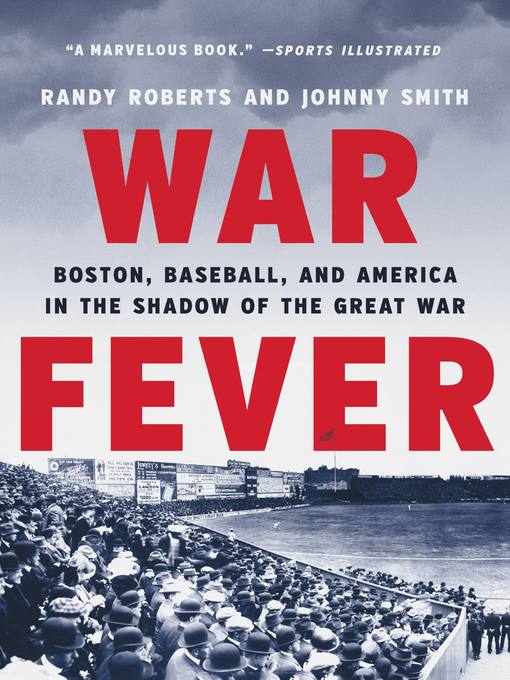
War Fever
Boston, Baseball, and America in the Shadow of the Great War
کتاب های مرتبط
- اطلاعات
- نقد و بررسی
- دیدگاه کاربران
نقد و بررسی

December 1, 2019
A lively historical account of 1918 Boston, a city obsessed with baseball and defeating the Kaiser in Germany. Roberts (History/Purdue Univ.) and Smith (History/Georgia Tech Univ.), co-authors of Blood Brothers: The Fatal Friendship Between Mohammad Ali and Malcolm X (2016), tell their story through the lives of two New Englanders--Charles Whittlesey, commander of the "lost battalion" in the Meuse-Argonne Offensive; and Karl Muck, the German conductor of the Boston Symphony Orchestra--and a Baltimore boy playing for the local team: George Herman "Babe" Ruth. As the authors write, the three "became, in 1918, the most famous war hero, war villain, and war athlete. Nearly everything they did was interpreted through the lens of the war." Whittlesey, an idealistic lawyer, enlisted in 1917. In 1918 in France, his battalion was surrounded. For five days, without food or water and running out of ammunition, they resisted German attacks and a request to surrender until relief arrived. Oppressed by his avalanche of fame, which continued after the war with demands for speeches, parades, and favors, he vanished during a cruise in 1921, probably a suicide. The authors stress that today's anti-Muslim prejudice pales in comparison to the nationwide anti-German hysteria that victimized the internationally acclaimed Muck. Although unashamedly German, he was no spy, terrorist, propagandist, or anti-American demagogue, accusations that poured from newspapers, women's clubs, patriotic organizations, and elected officials. Arrested in March 1918, he was interned in a Georgia camp for 18 months and then deported. That year, Babe Ruth was pitching for the Red Sox but was already nationally famous because of his slugging. At the time, baseball was in crisis, with teams crippled by enlistments and conscription and plummeting attendance. Concealing fears of bankruptcy behind fervent patriotism, owners proclaimed that baseball provided moral uplift to war-weary Americans and salvaged a shortened season and World Series that Boston, led by Ruth, won. An entertaining reminder that American hero worship, media hype, and fierce nationalism haven't changed much in a century.
COPYRIGHT(2019) Kirkus Reviews, ALL RIGHTS RESERVED.

January 6, 2020
Roberts and Smith, history professors at Purdue University and Georgia Tech respectively, portray the lives of three German-American men from Boston during WWI in this well-researched if flimsily connected sports history. The fever of the title refers to the Spanish flu epidemic of 1918, which killed millions worldwide, as well as to America’s frenzy to find German sympathizers and the country’s passion for baseball. At the center of this perfect storm of disease, war, politics, and sports are Karl Muck, the Boston Symphony Orchestra’s German-speaking immigrant conductor; Harvard-educated lawyer Charles Whittlesey; and Red Sox player Babe Ruth. Muck, who refused to play the National Anthem before a concert, was later accused of siding with Germany and interned in a Georgia prison camp. Whittlesey enlisted in the Army and became a hero for saving his “lost battalion.” Despite Ruth’s hardscrabble upbringing and German roots, he escaped anti-German sentiment and was on his way to becoming an American baseball legend by 1919. The authors combine detailed research and solid storytelling to illustrate the ways in which these three German-Americans, however tangentially connected, were defined—as “war hero, war villain, and war athlete.” Despite the tenuous connections between the main characters, this is a solid story of early-20th-century immigrant life.

January 24, 2020
Roberts (history, Purdue Univ.), with coauthor Smith (both, Blood Brothers: The Fatal Friendship Between Muhammad Ali and Malcolm X), explores World War I, specifically the year 1918, through the stories of three fascinating figures: legendary baseball player Babe Ruth, German-born Boston Symphony conductor Karl Muck, and soldier and Harvard-educated attorney Charles Whittlesey; each of whom were connected to the city of Boston at a time when death was rampant, as the Spanish flu was killing thousands and battles were raging overseas. Skillfully interweaving their subjects' stories while simultaneously conveying the culture of Boston at the time, the authors deliver a perhaps lesser-known side of Babe Ruth; a concentrated investigation of conductor Muck, who was accused of being a spy for his home country; and insight into Army Medal of Honor recipient Whittlesey, who led the "lost battalion" in the Meuse-Argonne offensive, known as the greatest in U.S. military history. Finally, the authors show how this period of wartime propaganda was not forgiving to some service members, carefully addressing this issue with sensitivity and care.
VERDICT A compelling look at a tumultuous moment in U.S. history through the lives of three extraordinary individuals. Fans of 20th-century American culture as well as Boston and World War I history will rejoice.--Gus Palas, Ela Area P.L., Lake Zurich, IL
Copyright 2020 Library Journal, LLC Used with permission.

























دیدگاه کاربران